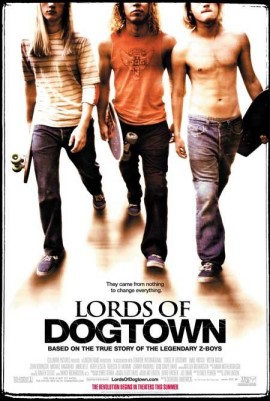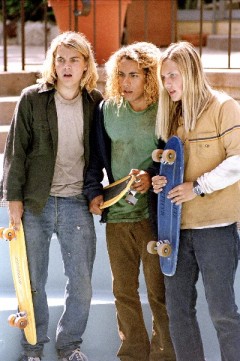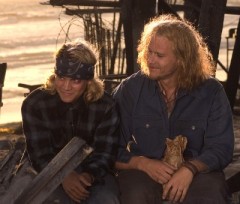Peralta walked
the walk - with his friends practically invented the walk
- and came out relatively unscathed. How a bunch of Venice
Beach street rats rose to the top of their game really is
the stuff of movies, if not of legend. In fact, it's almost
too good to be true, which makes for a vaguely unsatisfying
movie.
Directed by
Catherine Hardwicke, who proved her eye for teen life with
the frightening Thirteen, Lords of Dogtown
goes through all the right moves, but still comes up a little
flat. Maybe the revelation behind these legends is that
their story is far more interesting than they themselves
actually were.
Almost everything
about their backstories seems contrived, even though, according
to the history books, this is pretty much how it happened.
In an energetically staged opening, the main characters
sneak out of their homes to try and catch some waves before
school. Their devotion to surfing seems misplaced, as they
clearly skate much better than they shoot the curl.
This inspires
the Zephyr surf shop owner Skip Engblom (Heath Ledger) to
form a skateboard team, especially once he sees them experimenting
with wheels made from the new material "urethane." From
there it's a story older than rock and roll - success will
spoil some, ruin others and maybe the sweet kid that never
hurt anybody will survive.
Hardwicke and
Peralta assume we have a lot of prior knowledge. It isn't
until about halfway into the film before anybody offhandedly
references "Dogtown" (it's a poor neighborhood in Venice),
and by the time we see how revolutionary the Zephyr team's
style is, its impact is muted by our having been used to
it. For an audience likely only familiar with modern guys
like Tony Hawk, it might have been nice to see how sedate
skateboarding used to be before the Z-explosion.
Still, Hardwicke
proves she can handle the grit, and the scenes of competition
are exciting to watch. When things get quiet, however, the
drama never takes hold. Peralta's grasp of characterization
doesn't help, as he never allows even his own namesake to
show much depth. But it might have been nice if Hardwicke
had resisted the urge to telegraph every conflict, never
missing a chance to show jealous glowers long after we get
the point.
All the young
actors, however, do have a magnetism that holds the film
together. In the unenviable task of playing the writer,
John Robinson exudes sweetness (sorry, that's what it's
supposed to be) without becoming cloying. Maybe Peralta
made himself too noble, but Robinson makes it likable enough.
As the cocky Tony Alva, Victor Rasuk still manages a vulnerability
that keeps Alva from being annoying.
Tackling the
most complex of the three main Z-Boys, Emile Hirsch tries
his hardest with the role of Jay Adams. Called "the spark"
in the closing credits, Adams could not handle the sudden
fame. Partially due to bad business deals and partially
due to the most troubled childhood, he ends up the tragic
hero of Lords of Dogtown. Unfortunately, the script
gives Hirsch little besides anger, though he displays an
aggressive sexuality in a convincing seduction scene with
Nikki Reed.
Serving
as catalyst, father figure and obligatory surfer dude, Ledger
steals every scene from his hapless young co-stars. Tricked
out with slightly oversized teeth and a strange surfer cadence,
he still gives the most nuanced performance. Paired with
Hirsch, he provides one of the most real emotional moments
of the film.
As
fun to watch as it is, Lords of Dogtown doesn't have
enough of those moments. It may be based on a true story
and created by maverick artists, but it ends up feeling
pure Hollywood.








